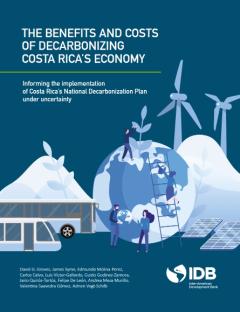
Given the socio-economic impacts of the COVID-19 pandemic, global leaders are seeking solutions to re-activate their economies while preserving the climate and mitigating the risk of future environmental crises. Costa Rica's National Decarbonization Plan sets the ambitious goal to become carbon neutral by 2050 and lays out a series of actions that government officials, sectoral stakeholders, and more generally Costa Rican citizens would need to implement throughout the economy to decarbonize. The extent to which the implementation of the decarbonization plan can be part of an effort to restart the economy post-COVID depends on the costs and socio-economic benefits it entails.
This report developed an integrated model that estimates the benefits and costs of implementing the decarbonization plan in all major sectors, informed by consultations with numerous government agencies, industries and non-governmental organizations. In its central scenario, decarbonization brings $41 billion in net benefits to Costa Rica between 2020 and 2050, using a 5 percent discount rate. In the land use sector, reducing emissions would lead to increased agricultural and livestock productivity, and increasing carbon sequestration by forests would lead to greater ecosystem services, such as renewable forestry products, water and soil benefits, and support for tourism and cultural heritage. In the transportation sector, the economic benefits from energy savings, fewer accidents, time saved from reduced congestion, and the reduced negative impacts of air pollution on health more than compensate for the initially higher upfront costs of switching to electric vehicles and building infrastructure for zero-emissions public transport. Energy savings in buildings, efficiency gains in industry, and the economic value of recycled materials and treated water complete its estimates.
